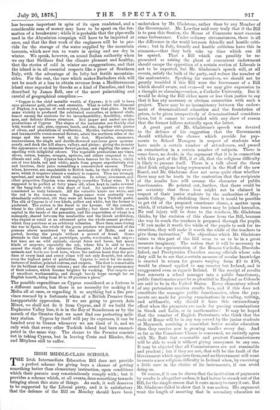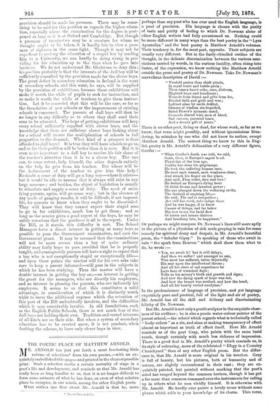IRISH MIDDLE-CLASS SCHOOLS.
THE Irish Intermediate Education Bill does not provide a perfect scheme for giving boys a chance of getting something better than elementary instruction, upon conditions which their parents may conscientiously comply with; but it provides a scheme which, at all events, does something towards bringing about this state of things. As such, it well deserves to be supported by the Liberal party, and it is satisfactory that the defence of the Bill on Monday should have been undertaken by Mr. Gladstone, rather than by any Member of the Government. Mr. Lowther said very truly that if the Bill is to pass this Session, the House of Commons must exercise some forbearance. Under ordinary circumstances, there is all the difference in the world between friendly and hostile criti- cism ; but in July, friendly and hostile criticism have this in common,—that they both take up time which can ill be spared. That a Bill which can possibly be re- presented as raising the ghost of concurrent endowment should escape the opposition of a certain section of Liberals is not to be expected, but Mr. Gladstone's speech will, at all events, satisfy the bulk of the party, and reduce the number of the malcontents. Speaking for ourselves, we should not be greatly troubled if this Bill were the forerunner of a Bill which should create, and even—if we may give expression to a thought so alarming—endow, a Catholic University. But it would be doing the Bill either more or less than justice to say that it has any necessary or obvious connection with such a project. There may be no inconsistency between the endow- ment of denominational education and the foundation of prizes, to be given irrespectively of denominational considera- tions, but it cannot be contended with any show of reason that the former follows naturally upon the latter.
A great part of Mr. Gladstone's speech was devoted to the defence of his suggestion that the Government should withdraw the clauses which provide for pay- ments to School Managers in respect of students who have made a certain number of attendances, and passed an examination in a certain number of subjects. There is some force, no doubt, in the argument that it is in connection with this part of the Bill, if at all, that the religious difficulty is likely to present itself. There is a talk about the three chief Irish religions being represented in the Staff of the new Board, and Mr. Gladstone does not seem quite clear whether there may not be truth in the contention that the recipients of the results fees will assume the character of public functionaries. He pointed out, further, that there could be no certainty that these fees might not be claimed in respect of their junior students by the authorities of May- nooth College. By abolishing these fees it would be possible to get rid of the proposed conscience clause, a matter upon which, if retained, very serious issues may be joined hereafter. No real injury will be done to the teachers, Mr. Gladstone thinks, by the excision of this clause from the Bill, because the way to reach the teachers is prepared through the pupils. " If you make it worth the while of the pupils to seek for in- struction, they will make it worth the while of the teachers to give them instruction." The objections which Mr. Gladstone raises to this part of the Bill seem to us to be in a great measure imaginary. The notion that it will be necessary to secure a due representation of the Roman Catholic, Disestab- lished, and Presbyterian Churches among officials whose sole duty will be to see that a certain measure of secular knowledge is exacted in return for grants varying from £3 to £10, would be absurd applied to any country but Ireland, and is exaggerated even as regards Ireland. If the receipt of results fees converts a school manager into a public functionary, public functionaries must be as plentiful in England as Colonels are said to be in the United States. Every elementary school of any pretensions receives results fees, and if this does not constitute the managers public functionaries, when the pay- ments are made for passing examinations in reading, writing, and arithmetic, why should it have this extraordinary effect when the payments are made for passing examinations in Greek and Latin, or in mathematics ? It may be hoped that the number of English Protestants who think that the ends of Rome will be in any way served by the junior students at Maynooth receiving a somewhat better secular education than they receive now is growing smaller every day. And so far as the Conscience Clause is concerned, we entirely agree with Mr. Butt that reasonable and prudent Commissioners will be able to work it without giving annoyance to any one. It may be objected that all Commissioners are not reasonable and prudent ; but if they are not, that will be the fault of the Government which appoints them, and no Government will want to create a new religious difficulty in Ireland when, by exercising a little care in the choice of its instruments, it can avoid doing so.
Of course, if it can be shown that the institution of payments by results is altogether useless, it had better be struck out of the Bill, for the simple reason that it costs money to carry it out. But Mr. Gladstone failed to show that it was useless. His argument went the length of asserting that in secondary education no provision should be made for passmen. There may be some- thing to be said for this position as regards the higher educa- tion, especially where the examination for the degree is post- poned as long as it is at Oxford and Cambridge. But though a passman of twenty-two may be a creature for whom no thought ought to be taken, it is hardly fair to view a pass- man of eighteen in the same light. Though it may not be expedient to prolong the education of a stupid boy by sending him to a University, we can hardly be doing wrong in pro- viding for his education up to the time when he goes into business. We do not understand Mr. Gladstone to deny this ; his position probably is that the interests of the dull boy will be sufficiently consulted by the provision made for the clever boys. The great defect in secondary education in Ireland is the want of secondary schools, and this want, he says, will be supplied by the provision of exhibitions, because these exhibitions will make it worth the while of pupils to seek for instruction, and so make it worth the while of teachers to give them instruc- tion. Let it be conceded that this will be the case, so far as the foundation of new schools or the improvement of existing schools is concerned. The parents of dull boys will then be no longer in any difficulty as to where they shall send their sons to be educated. The hope of getting exhibitions will keep every school sufficiently supplied with clever boys, and the knowledge that there are sufficient clever boys looking about for a school will ensure the multiplication of schools in full proportion to the demand. What kind of a prospect is thus afforded to dull boys ? It is true they will have schools to go to, and so far their position will be better than it is now. But it is even more important to a dull boy to receive his fair share of the teacher's attention than it is to a clever bov. The one can, to some extent, help himself, the other depends entirely on the help he gets from his teacher. But where will be the inducement of the teacher to give him this help ? No doubt a sense of duty will go a long way—where it exists— but it would be idle to assume that it always will exist in any large measure ; and besides, the object of legislation is usually to stimulate and supply a sense of duty. The need of satis- fying parents, again, will go some way ; but in the absence of any mode of gauging results, it will be difficult, if not impossi- ble, for parents to know when they ought to be dissatisfied. They will know that they cannot expect their stupid sons to go in for exhibitions, much less to get them ; and so long as the master gives a good report of the boys, he may be safely conscious that the goodness is all in the report. Under the Bill, as it stands, this difficulty is met. The School Managers have a direct interest in getting as many boys as possible to pass the Government examination, and earn the Government grant. It may be assumed that the examinations will not be more severe than a boy of quite ordinary ability may fairly hope to pass, provided that he is properly taught, and consequently parents will have a right to expect that a boy who is not exceptionally stupid or exceptionally idle— and upon these points the teacher will for his own sake take care to keep a parent informed—will pass in the subjects in which he has been studying. Thus the master will have a double interest in getting the boy on,—an interest in getting the grant for the managers, who are directly his employers, and an interest in pleasing the parents, who are indirectly his employers. It seems to us that this constitutes a solid advantage, in consideration of which it is distinctly worth while to incur the additional expense which the retention of this part of the Bill undoubtedly involves, and the difficulties which it may conceivably involve. In old foundations, such as the English Public Schools, there is not much fear of the dull boys not holding their own. Tradition and vested interests of all kinds are on their side. But when a system of secondary education has to be created anew, it is not prudent, when drafting the scheme, to have only clever boys in view.



































 Previous page
Previous page